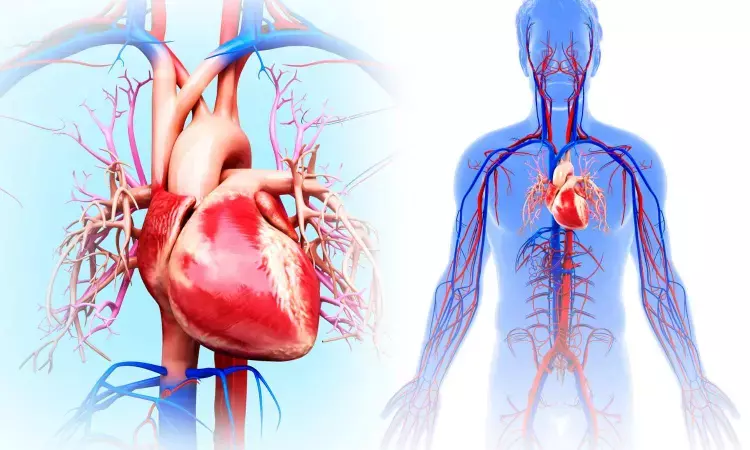- Home
- Medical news & Guidelines
- Anesthesiology
- Cardiology and CTVS
- Critical Care
- Dentistry
- Dermatology
- Diabetes and Endocrinology
- ENT
- Gastroenterology
- Medicine
- Nephrology
- Neurology
- Obstretics-Gynaecology
- Oncology
- Ophthalmology
- Orthopaedics
- Pediatrics-Neonatology
- Psychiatry
- Pulmonology
- Radiology
- Surgery
- Urology
- Laboratory Medicine
- Diet
- Nursing
- Paramedical
- Physiotherapy
- Health news
- Fact Check
- Bone Health Fact Check
- Brain Health Fact Check
- Cancer Related Fact Check
- Child Care Fact Check
- Dental and oral health fact check
- Diabetes and metabolic health fact check
- Diet and Nutrition Fact Check
- Eye and ENT Care Fact Check
- Fitness fact check
- Gut health fact check
- Heart health fact check
- Kidney health fact check
- Medical education fact check
- Men's health fact check
- Respiratory fact check
- Skin and hair care fact check
- Vaccine and Immunization fact check
- Women's health fact check
- AYUSH
- State News
- Andaman and Nicobar Islands
- Andhra Pradesh
- Arunachal Pradesh
- Assam
- Bihar
- Chandigarh
- Chattisgarh
- Dadra and Nagar Haveli
- Daman and Diu
- Delhi
- Goa
- Gujarat
- Haryana
- Himachal Pradesh
- Jammu & Kashmir
- Jharkhand
- Karnataka
- Kerala
- Ladakh
- Lakshadweep
- Madhya Pradesh
- Maharashtra
- Manipur
- Meghalaya
- Mizoram
- Nagaland
- Odisha
- Puducherry
- Punjab
- Rajasthan
- Sikkim
- Tamil Nadu
- Telangana
- Tripura
- Uttar Pradesh
- Uttrakhand
- West Bengal
- Medical Education
- Industry
Amulet Left Atrial Appendage Occluder Shows Promise in 3-Year Outcomes Study

The investigational Amulet Left Atrial Appendage (LAA) Occluder, developed by Abbott, has demonstrated favourable outcomes in a study comparing it to Boston Scientific's Watchman 2.5 device through three years as published in JACC: Cardiovascular Interventions by Dhanunjaya Lakkireddy and colleagues. This study is part of the largest randomised trial evaluating the safety and effectiveness of the Amulet device.
The study aimed to assess the device's impact on key clinical outcomes at the three-year mark. These outcomes included:
The composite of ischemic stroke or systemic embolism (SE).
The composite of all strokes, SE, or cardiovascular (CV) death.
Incidence of major bleeding.
All-cause death and CV death.
● The trial involved 1,878 patients across 108 sites who were randomised into two groups. Some key findings from the study include:
● Reduced Anticoagulation Usage: A significantly higher percentage of patients using the Amulet device (96.2%) were free from oral anticoagulation at three years compared to those using the Watchman device (92.5%).
● Comparable Clinical Outcomes: The study found similar clinical outcomes between the two devices, with no significant differences in the rates of ischemic stroke or SE (5.0% vs. 4.6%), the composite of all strokes, SE, or CV death (11.1% vs. 12.7%), major bleeding (16.1% vs. 14.7%), all-cause death (14.6% vs. 17.9%), and CV death (6.6% vs. 8.5%) for the Amulet and Watchman devices, respectively.
● Device-Related Factors: Device-related factors such as device-related thrombus or peridevice leak ≥3 mm were more frequently observed in Watchman patients compared to Amulet patients.
The Amulet LAA Occluder demonstrated continued safety and effectiveness over three years. Importantly, it showed a higher percentage of patients free from oral anticoagulation compared to the Watchman device, which could have significant implications for patient management. The study results suggest that the Amulet device is a promising option for high-risk patients. However, it's essential to note that these findings should be considered within the context of ongoing research and clinical practice, and individual patient care decisions should involve consultation with healthcare professionals. This study contributes valuable insights into the evolving landscape of LAA occlusion devices and their potential benefits for patients at risk of stroke or embolism.
Reference:
Lakkireddy, D., Thaler, D., Ellis, C. R., Swarup, V., Gambhir, A., Hermiller, J., Nielsen-Kudsk, J. E., Worthley, S., Nair, D., Schmidt, B., Horton, R., Gupta, N., Anderson, J. A., Gage, R., Alkhouli, M., & Windecker, S. (2023). 3-year outcomes from the Amplatzer amulet left atrial appendage occluder randomized controlled trial (amulet IDE). JACC. Cardiovascular Interventions, 16(15), 1902–1913. https://doi.org/10.1016/j.jcin.2023.06.022
Dr Kamal Kant Kohli-MBBS, DTCD- a chest specialist with more than 30 years of practice and a flair for writing clinical articles, Dr Kamal Kant Kohli joined Medical Dialogues as a Chief Editor of Medical News. Besides writing articles, as an editor, he proofreads and verifies all the medical content published on Medical Dialogues including those coming from journals, studies,medical conferences,guidelines etc. Email: drkohli@medicaldialogues.in. Contact no. 011-43720751


